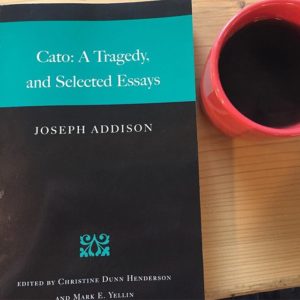
What does it mean to be a virtuous citizen in a republic?
America’s founding father’s were designing a system of government in reaction to the English Monarchy. They studied political theorists from Aristotle to Locke. And it was the history of the Roman republic, and it’s decline into tyranny, that guided many of the decisions that were made about the framing of our government.
Cato: A Tragedy, by Joseph Addison, was one of the most popular plays during the American Revolution. Ben Franklin copied it out by hand. Patrick Henry adapted portions of the play to form his famous speech – “Give me liberty of give me death.” And George Washington quoted lines from the play to rally troops on the battlefield.
Why did this play command so much mind share?
Virtue.
Cato gave his life in an attempt to save Rome and the Senate from a tyrant – Caesar. He would rather take his own life than see the republic fall. Cato epitomized virtue, he was selfless, never compromising, and devoted to the public. Many political theorists believe that public virtue is the foundational habit of a republic. And in their private letters, both Washington and Hamilton cite Cato’s example as helping them to overcome their shortcomings and set the baseline for how leaders in a republic should act. This play catalyzed the spread, across America’s and England’s middle classes, of a culture of civic responsibility.
In this play the greatest thread to liberty (and the virtuous Cato) is a popular figure who appeals to the masses with bribes, promises, and charisma.
Unsurprisingly, Addison wove in Stoic philosophy throughout his play. Cato exemplifies the Stoic ideal. He is intensely logical, has control over his emotions, and fights for his ideals. Cato has an unwavering commitment to his principles and the standards of the Roman Republic.
Cato isn’t the easiest book to read. The English is antiquated, and I often found myself spending an hour here or there in the wikipedia rabbit hole while I brushed up on my history to gain the historical context for the play.
While I was reading this play I couldn’t help to draw parallels to the current leader of the American Republic. How would our founding father’s judge his virtues? Which of our senators would be willing to stand up and commit suicide (career or otherwise) to defend the sanctity of our government?
Give it a read and let me know.